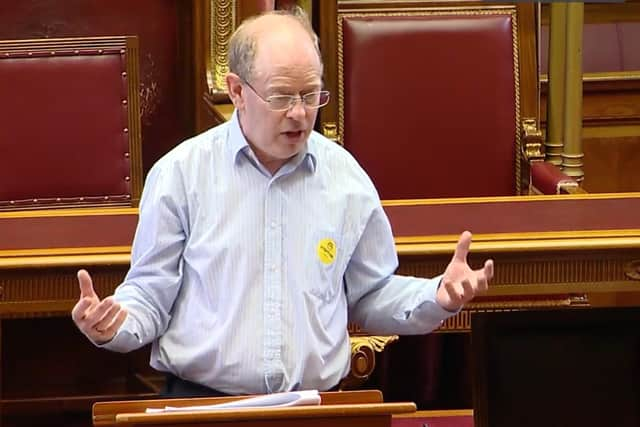Northern Irish economist: Chancellor's tax cuts to the average worker are likely to get wiped out by rising costs
and live on Freeview channel 276
In other words, despite the government’s mooted boost to people’s spending power of a few hundred pounds per person, per year, workers will not actually be much better off in real terms.
Dr Birnie, senior economist at the University of Ulster (and former UUP MLA for South Belfast from 1998 until 2007) was reacting to the Autumn Statement, delivered by Chancellor of the Exchequer Jeremy Hunt on Wednesday.
Advertisement
Hide AdAdvertisement
Hide AdArguably the main thrust of the Autumn Statement was that the amount people pay in National Insurance will drop.


For almost everybody earning between about £12,500 and £50,200, the amount of National Insurance being deducted from their pay packets right now is 12%.
The government is cutting this to 10% from January, which will mean the average worker earning £35,400 a year shall see “an over £450 annual tax cut”, according to Mr Hunt.
Meanwhile, National Insurance for self-employed people is dropping from 9% to 8%.
Advertisement
Hide AdAdvertisement
Hide AdSelf-employed national insurance is more complicated: it only applies to profits which a self-employed worker earns between £12,570 and £50,270.
A cut from 9% to 8%, the chancellor says, means “saving the average self-employed person on £28,200 a year £350”. This will kick in from April 2024.
These cuts were welcomed by the DUP, among many others.
But Dr Birnie cautions that they may amount to little.
"The 2% National Insurance reduction will be a welcome tax reduction for many people,” he said.
"For an average wage/salary in NI, it represents about £300 – 400 annually.
Advertisement
Hide AdAdvertisement
Hide Ad“But, of course, inflation continues to eat away at real living standards.
"Even at about 5% inflation (rather than about 10%) you would need a lot more than £400 to protect the purchasing power of your earnings.”
-
WHERE ARE WE AT WITH INFLATION RIGHT NOW?
Inflation stood at 11% a year ago.
It has now come down to 4.6%.
However, those figures represent the CPI measure of inflation.
Another way of calculating inflation, known as RPI, says that the current rate is actually 6.1%.
Advertisement
Hide AdAdvertisement
Hide AdEconomists have long argued over which is the more reliable figure, and have generally come down on the side of CPI.
But whichever calculation you choose, both figures are still way above the government’s inflation target of 2%.
MORE FROM THIS REPORTER:
Another aspect of the Autumn Statement was that some of the extra money which is due to come to Northern Ireland will just go towards plugging the black hole in the Province’s public finances.
It is thought that the Autumn Statement will result in about £110m in extra cash being added to Northern Ireland’s overall budget (a relatively trifling sum compared to the overall budget of £4.2bn).
Advertisement
Hide AdAdvertisement
Hide AdBut Northern Ireland racked up a £297m overspend in 2022/23, and is on course to overspend during the 2023/24 financial year, too, so it is understood that about £75m which would otherwise have been added to that £110m will instead be spent just paying off this debt.
Dr Birnie said this is the result of a “breakdown” in spending restraint just before Stormont lost all its ministers.
“Because this Autumn Statement was much more about tax cutting (particularly business taxes) than adding to spending in England, the extra funding for public services in NI (called the Barnett consequential) was quite small – £185m over the next two years,” he said.
"Immediately prior to the Executive Ministers in Stormont ceasing to be in office (the Executive had ceased to operate in early 2022, but the departmental ministers continued as caretakers for six months) in late 2022, NI built up an overspend of just under £300m which necessitated what was in effect a ‘loan’ from the UK Exchequer.
Advertisement
Hide AdAdvertisement
Hide Ad"Repaying that ‘debt’ takes first call on any extra money NI would otherwise get from the Treasury.
"Whilst there were a range of explanations (inflation and the so-called Barnett Squeeze), the system of public spending control in NI in 2022 broke down – and there are consequences.”